Fleurs du Mal Magazine


Or see the index
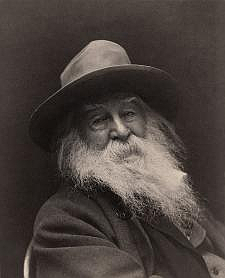
Adieu To a Soldier
Adieu, O soldier!
You of the rude campaigning, (which we shared,)
The rapid march, the life of the camp,
The hot contention of opposing fronts’the long maneuver,
Red battles with their slaughter, ‘the stimulus’the strong, terrific game,
Spell of all brave and manly hearts’the trains of Time through you, and like of you, all fill’d,,
With war, and war’s expression.
Adieu, dear comrade!
Your mission is fulfill’d—but I, more warlike,
Myself, and this contentious soul of mine,
Still on our own campaigning bound,
Through untried roads, with ambushes, opponents lined,
Through many a sharp defeat and many a crisis’often baffled,
Here marching, ever marching on, a war fight out’aye here,
To fiercer, weightier battles give expression.
Walt Whitman
(1819 – 1892)
Poem: Adieu To a Soldier
• fleursdumal.nl magazine
More in: Archive W-X, Archive W-X, Whitman, Walt
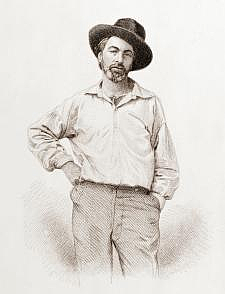
Beat! Beat! Drums!
Beat! beat! drums!–Blow! bugles! blow!
Through the windows–through doors–burst like a ruthless force,
Into the solemn church, and scatter the congregation;
Into the school where the scholar is studying;
Leave not the bridegroom quiet–no happiness must he have now with his bride;
Nor the peaceful farmer any peace, plowing his field or gathering his grain;
So fierce you whirr and pound, you drums–so shrill you bugles blow.
Beat! beat! drums!–Blow! bugles! blow!
Over the traffic of cities–over the rumble of wheels in the streets:
Are beds prepared for sleepers at night in the houses? No sleepers must sleep in those beds;
No bargainers’ bargains by day–no brokers or speculators–Would they continue?
Would the talkers be talking? would the singer attempt to sing?
Would the lawyer rise in the court to state his case before the judge?
Then rattle quicker, heavier drums–you bugles wilder blow.
Beat! beat! drums!–Blow! bugles! blow!
Make no parley–stop for no expostulation;
Mind not the timid–mind not the weeper or prayer;
Mind not the old man beseeching the young man;
Let not the child’s voice be heard, nor the mother’s entreaties;
Make even the trestles to shake the dead, where they lie awaiting the hearses,
So strong you thump, O terrible drums–so loud you bugles blow.
Walt Whitman
(1819 – 1892)
Poem: Beat! Beat! Drums!
• fleursdumal.nl magazine
More in: Archive W-X, Archive W-X, Whitman, Walt

When I Heard the Learn’d Astronomer
When I heard the learn’d astronomer;
When the proofs, the figures, were ranged in columns before me;
When I was shown the charts and the diagrams, to add, divide, and measure them;
When I, sitting, heard the astronomer, where he lectured with much applause in the lecture-room,
How soon, unaccountable, I became tired and sick;
Till rising and gliding out, I wander’d off by myself,
In the mystical moist night-air, and from time to time,
Look’d up in perfect silence at the stars.
Walt Whitman
(1819 – 1892)
Poem: When I Heard the Learn’d Astronomer
• fleursdumal.nl magazine
More in: Archive W-X, Archive W-X, Whitman, Walt
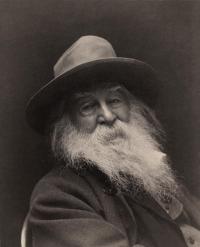
On the Beach at Night
On the beach at night,
Stands a child with her father,
Watching the east, the autumn sky.
Up through the darkness,
While ravening clouds, the burial clouds, in black masses spreading,
Lower sullen and fast athwart and down the sky,
Amid a transparent clear belt of ether yet left in the east,
Ascends large and calm the lord-star Jupiter,
And nigh at hand, only a very little above,
Swim the delicate sisters the Pleiades.
From the beach the child holding the hand of her father,
Those burial-clouds that lower victorious soon to devour all,
Watching, silently weeps.
Weep not, child,
Weep not, my darling,
With these kisses let me remove your tears,
The ravening clouds shall not long be victorious,
They shall not long possess the sky, they devour the stars only in apparition,
Jupiter shall emerge, be patient, watch again another night, the Pleiades shall emerge,
They are immortal, all those stars both silvery and golden shall shine out again,
The great stars and the little ones shall shine out again, they endure,
The vast immortal suns and the long-enduring pensive moons shall again shine.
Then dearest child mournest thou only for Jupiter?
Considerest thou alone the burial of the stars?
Something there is,
(With my lips soothing thee, adding I whisper,
I give thee the first suggestion, the problem and indirection,)
Something there is more immortal even than the stars,
(Many the burials, many the days and nights, passing away,)
Something that shall endure longer even than lustrous Jupiter
Longer than sun or any revolving satellite,
Or the radiant sisters the Pleiades.
Walt Whitman
(1819–1892)
On the Beach at Night
• fleursdumal.nl magazine
More in: Archive W-X, Archive W-X, Whitman, Walt

Song of the banner
at daybreak
Poet
O a new song, a free song,
Flapping, flapping, flapping, flapping, by sounds, by voices clearer,
By the wind’s voice and that of the drum,
By the banner’s voice and child’s voice and sea’s voice and father’s voice,
Low on the ground and high in the air,
On the ground where father and child stand,
In the upward air where their eyes turn,
Where the banner at daybreak is flapping.
Words! bookwords! what are you?
Words no more, for hearken and see,
My song is there in the open air, and I must sing,
With the banner and pennant a-flapping.
I’ll weave the chord and twine in,
Man’s desire and babe’s desire, I’ll twine them in, I’ll put in life,
I’ll put the bayonet’s flashing point, I’ll let bullets and slugs whizz,
(As one carrying a symbol and menace far into the future,
Crying with trumpet voice, _Arouse and beware! Beware and arouse!_)
I’ll pour the verse with streams of blood, full of volition, full of joy.
Then loosen, launch forth, to go and compete,
With the banner and pennant a-flapping.
Pennant
Come up here, bard, bard,
Come up here, soul, soul,
Come up here, dear little child,
To fly in the clouds and winds with me, and play with the measureless light.
Child
Father what is that in the sky beckoning to me with long finger?
And what does it say to me all the while?
Father
Nothing my babe you see in the sky,
And nothing at all to you it says–but look you my babe,
Look at these dazzling things in the houses, and see you the money-shops opening,
And see you the vehicles preparing to crawl along the streets with goods;
These, ah these, how valued and toil’d for these!
How envied by all the earth.
Poet
Fresh and rosy red the sun is mounting high,
On floats the sea in distant blue careering through its channels,
On floats the wind over the breast of the sea setting in toward land,
The great steady wind from west or west-by-south,
Floating so buoyant with milk-white foam on the waters.
But I am not the sea nor the red sun,
I am not the wind with girlish laughter,
Not the immense wind which strengthens, not the wind which lashes,
Not the spirit that ever lashes its own body to terror and death,
But I am that which unseen comes and sings, sings, sings,
Which babbles in brooks and scoots in showers on the land,
Which the birds know in the woods mornings and evenings,
And the shore-sands know and the hissing wave, and that banner and pennant,
Aloft there flapping and flapping.
Child
O father it is alive–it is full of people–it has children,
O now it seems to me it is talking to its children,
I hear it–it talks to me–O it is wonderful!
O it stretches–it spreads and runs so fast–O my father,
It is so broad it covers the whole sky.
Father
Cease, cease, my foolish babe,
What you are saying is sorrowful to me, much it displeases me;
Behold with the rest again I say, behold not banners and pennants aloft,
But the well-prepared pavements behold, and mark the solid-wall’d houses.
Banner and Pennant
Speak to the child O bard out of Manhattan,
To our children all, or north or south of Manhattan,
Point this day, leaving all the rest, to us over all–and yet we know not why,
For what are we, mere strips of cloth profiting nothing,
Only flapping in the wind?
Poet
I hear and see not strips of cloth alone,
I hear the tramp of armies, I hear the challenging sentry,
I hear the jubilant shouts of millions of men, I hear Liberty!
I hear the drums beat and the trumpets blowing,
I myself move abroad swift-rising flying then,
I use the wings of the land-bird and use the wings of the sea-bird, and look down as from a height,
I do not deny the precious results of peace, I see populous cities with wealth incalculable,
I see numberless farms, I see the farmers working in their fields or barns,
I see mechanics working, I see buildings everywhere founded, going up, or finished,
I see trains of cars swiftly speeding along railroad tracks drawn by the locomotives,
I see the stores, depots, of Boston, Baltimore, Charleston, New Orleans,
I see far in the West the immense area of grain, I dwell awhile hovering,
I pass to the lumber forests of the North, and again to the Southern plantation, and again to California;
Sweeping the whole I see the countless profit, the busy gatherings, earn’d wages,
See the Identity formed out of thirty-eight spacious and haughty
States, (and many more to come,)
See forts on the shores of harbors, see ships sailing in and out;
Then over all, (aye! aye!) my little and lengthen’d pennant shaped like a sword,
Runs swiftly up indicating war and defiance–and now the halyards have rais’d it,
Side of my banner broad and blue, side of my starry banner,
Discarding peace over all the sea and land.
Banner and Pennant
Yet louder, higher, stronger, bard! yet farther, wider cleave!
No longer let our children deem us riches and peace alone,
We may be terror and carnage, and are so now,
Not now are we any one of these spacious and haughty States, (nor any five, nor ten,)
Nor market nor depot we, nor money-bank in the city,
But these and all, and the brown and spreading land, and the mines below, are ours,
And the shores of the sea are ours, and the rivers great and small,
And the fields they moisten, and the crops and the fruits are ours,
Bays and channels and ships sailing in and out are ours–while we over all,
Over the area spread below, the three or four millions of square miles, the capitals,
The forty millions of people,–O bard! in life and death supreme,
We, even we, henceforth flaunt out masterful, high up above,
Not for the present alone, for a thousand years chanting through you,
This song to the soul of one poor little child.
Child
O my father I like not the houses,
They will never to me be any thing, nor do I like money,
But to mount up there I would like, O father dear, that banner I like,
That pennant I would be and must be.
Father
Child of mine you fill me with anguish,
To be that pennant would be too fearful,
Little you know what it is this day, and after this day, forever,
It is to gain nothing, but risk and defy every thing,
Forward to stand in front of wars–and O, such wars!–what have you to do with them?
With passions of demons, slaughter, premature death?
Banner
Demons and death then I sing,
Put in all, aye all will I, sword-shaped pennant for war,
And a pleasure new and ecstatic, and the prattled yearning of children,
Blent with the sounds of the peaceful land and the liquid wash of the sea,
And the black ships fighting on the sea envelop’d in smoke,
And the icy cool of the far, far north, with rustling cedars and pines,
And the whirr of drums and the sound of soldiers marching, and the hot sun shining south,
And the beach-waves combing over the beach on my Eastern shore, and my Western shore the same,
And all between those shores, and my ever running Mississippi with bends and chutes,
And my Illinois fields, and my Kansas fields, and my fields of Missouri,
The Continent, devoting the whole identity without reserving an atom,
Pour in! whelm that which asks, which sings, with all and the yield of all,
Fusing and holding, claiming, devouring the whole,
No more with tender lip, nor musical labial sound,
But out of the night emerging for good, our voice persuasive no more,
Croaking like crows here in the wind.
Poet
My limbs, my veins dilate, my theme is clear at last,
Banner so broad advancing out of the night, I sing you haughty and resolute,
I burst through where I waited long, too long, deafen’d and blinded,
My hearing and tongue are come to me, (a little child taught me,)
I hear from above O pennant of war your ironical call and demand,
Insensate! insensate! (yet I at any rate chant you,) O banner!
Not houses of peace indeed are you, nor any nor all their prosperity,
(if need be, you shall again have every one of those houses to destroy them,
You thought not to destroy those valuable houses, standing fast, full of comfort, built with money,
May they stand fast, then? not an hour except you above them and all stand fast;)
O banner, not money so precious are you, not farm produce you, nor the material good nutriment,
Nor excellent stores, nor landed on wharves from the ships,
Not the superb ships with sail-power or steam-power, fetching and carrying cargoes,
Nor machinery, vehicles, trade, nor revenues–but you as henceforth I see you,
Running up out of the night, bringing your cluster of stars, (ever-enlarging stars,)
Divider of daybreak you, cutting the air, touch’d by the sun, measuring the sky,
(Passionately seen and yearn’d for by one poor little child,
While others remain busy or smartly talking, forever teaching thrift, thrift;)
O you up there! O pennant! where you undulate like a snake hissing so curious,
Out of reach, an idea only, yet furiously fought for, risking bloody death, loved by me,
So loved–O you banner leading the day with stars brought from the night!
Valueless, object of eyes, over all and demanding all–(absolute owner of all)–O banner and pennant!
I too leave the rest–great as it is, it is nothing–houses, machines are nothing–I see them not,
I see but you, O warlike pennant! O banner so broad, with stripes, I sing you only,
Flapping up there in the wind.
Walt Whitman
(1819 – 1892)
Song of the banner at daybreak
From: Leaves of grass
• fleursdumal.nl magazine
More in: Archive W-X, Archive W-X, Whitman, Walt
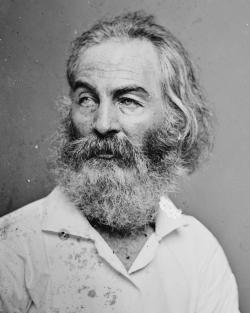
The wound-dresser
1
An old man bending I come among new faces,
Years looking backward resuming in answer to children,
Come tell us old man, as from young men and maidens that love me,
(Arous’d and angry, I’d thought to beat the alarum, and urge relentless war,
But soon my fingers fail’d me, my face droop’d and I resign’d myself,
To sit by the wounded and soothe them, or silently watch the dead;)
Years hence of these scenes, of these furious passions, these chances,
Of unsurpass’d heroes, (was one side so brave? the other was equally brave;)
Now be witness again, paint the mightiest armies of earth,
Of those armies so rapid so wondrous what saw you to tell us?
What stays with you latest and deepest? of curious panics,
Of hard-fought engagements or sieges tremendous what deepest remains?
2
O maidens and young men I love and that love me,
What you ask of my days those the strangest and sudden your talking recalls,
Soldier alert I arrive after a long march cover’d with sweat and dust,
In the nick of time I come, plunge in the fight, loudly shout in the rush of successful charge,
Enter the captur’d works–yet lo, like a swift-running river they fade,
Pass and are gone they fade–I dwell not on soldiers’ perils or soldiers’ joys,
(Both I remember well-many the hardships, few the joys, yet I was content.)
But in silence, in dreams’ projections,
While the world of gain and appearance and mirth goes on,
So soon what is over forgotten, and waves wash the imprints off the sand,
With hinged knees returning I enter the doors, (while for you up there,
Whoever you are, follow without noise and be of strong heart.)
Bearing the bandages, water and sponge,
Straight and swift to my wounded I go,
Where they lie on the ground after the battle brought in,
Where their priceless blood reddens the grass the ground,
Or to the rows of the hospital tent, or under the roof’d hospital,
To the long rows of cots up and down each side I return,
To each and all one after another I drawn near, not one do I miss,
An attendant follows holding a tray, he carries a refuse pail,
Soon to be fill’d with clotted rags and blood, emptied, and fill’d again.
I onward go, I stop,
With hinged knees and steady hand to dress wounds,
I am firm with each, the pangs are sharp yet unavoidable,
One turns to me his appealing eyes-poor boy! I never knew you,
Yet I think I could not refuse this moment to die for you, if that would save you.
3
On, on I go, (open doors of time! open hospital doors!)
The crush’d head I dress, (poor crazed hand tear not the bandage away,)
The neck of the cavalry-man with the bullet through and through I examine,
Hard the breathing rattles, quite glazed already the eye, yet life struggles hard,
(Come sweet death! be persuaded O beautiful death!
In mercy come quickly.)
From the stump of the arm, the amputated hand,
I undo the clotted lint, remove the slough, wash off the matter and blood,
Back on his pillow the soldier bends with curv’d neck and side-falling head,
His eyes are closed, his face is pale, he dares not look on the bloody stump,
And has not yet look’d on it.
I dress a wound in the side, deep, deep,
But a day or two more, for see the frame all wasted and sinking,
And the yellow-blue countenance see.
I dress the perforated shoulder, the foot with the bullet-wound,
Cleanse the one with a gnawing and putrid gangrene, so sickening, so offensive,
While the attendant stands behind aside me holding the tray and pail.
I am faithful, I do not give out,
The fractur’d thigh, the knee, the wound in the abdomen,
These and more I dress with impassive hand, (yet deep in my breast a fire, a burning flame.)
4
Thus in silence in dreams’ projections,
Returning, resuming, I thread my way through the hospitals,
The hurt and wounded I pacify with soothing hand,
I sit by the restless all the dark night, some are so young,
Some suffer so much, I recall the experience sweet and sad,
(Many a soldier’s loving arms about this neck have cross’d and rested,
Many a soldier’s kiss dwells on these bearded lips.)
Walt Whitman
(1819 – 1892)
The wound-dresser
From: Leaves of grass
• fleursdumal.nl magazine
More in: Archive W-X, Archive W-X, Whitman, Walt
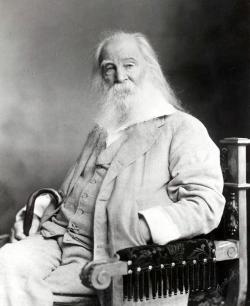
Give me the splendid silent sun
1
Give me the splendid silent sun with all his beams full-dazzling,
Give me juicy autumnal fruit ripe and red from the orchard,
Give me a field where the unmow’d grass grows,
Give me an arbor, give me the trellis’d grape,
Give me fresh corn and wheat, give me serene-moving animals teaching content,
Give me nights perfectly quiet as on high plateaus west of the Mississippi, and I looking up at the stars,
Give me odorous at sunrise a garden of beautiful flowers where I can walk undisturb’d,
Give me for marriage a sweet-breath’d woman of whom I should never tire,
Give me a perfect child, give me away aside from the noise of the world a rural domestic life,
Give me to warble spontaneous songs recluse by myself, for my own ears only,
Give me solitude, give me Nature, give me again O Nature your primal sanities!
These demanding to have them, (tired with ceaseless excitement, and rack’d by the war-strife,)
These to procure incessantly asking, rising in cries from my heart,
While yet incessantly asking still I adhere to my city,
Day upon day and year upon year O city, walking your streets,
Where you hold me enchain’d a certain time refusing to give me up,
Yet giving to make me glutted, enrich’d of soul, you give me forever faces;
(O I see what I sought to escape, confronting, reversing my cries,
I see my own soul trampling down what it ask’d for.)
2
Keep your splendid silent sun,
Keep your woods O Nature, and the quiet places by the woods,
Keep your fields of clover and timothy, and your corn-fields and orchards,
Keep the blossoming buckwheat fields where the Ninth-month bees hum;
Give me faces and streets–give me these phantoms incessant and endless along the trottoirs!
Give me interminable eyes–give me women–give me comrades and lovers by the thousand!
Let me see new ones every day–let me hold new ones by the hand every day!
Give me such shows–give me the streets of Manhattan!
Give me Broadway, with the soldiers marching–give me the sound of the trumpets and drums!
(The soldiers in companies or regiments–some starting away, flush’d and reckless,
Some, their time up, returning with thinn’d ranks, young, yet very old, worn, marching, noticing nothing;)
Give me the shores and wharves heavy-fringed with black ships!
O such for me! O an intense life, full to repletion and varied!
The life of the theatre, bar-room, huge hotel, for me!
The saloon of the steamer! the crowded excursion for me! the torchlight procession!
The dense brigade bound for the war, with high piled military wagons following;
People, endless, streaming, with strong voices, passions, pageants,
Manhattan streets with their powerful throbs, with beating drums as now,
The endless and noisy chorus, the rustle and clank of muskets, (even the sight of the wounded,)
Manhattan crowds, with their turbulent musical chorus!
Manhattan faces and eyes forever for me.
Walt Whitman
(1819 – 1892)
Give me the splendid silent sun
From: Leaves of grass
• fleursdumal.nl magazine
More in: Archive W-X, Archive W-X, Whitman, Walt

City of ships
City of ships!
(O the black ships! O the fierce ships!
O the beautiful sharp-bow’d steam-ships and sail-ships!)
City of the world! (for all races are here,
All the lands of the earth make contributions here;)
City of the sea! city of hurried and glittering tides!
City whose gleeful tides continually rush or recede, whirling in and
out with eddies and foam!
City of wharves and stores–city of tall façades of marble and iron!
Proud and passionate city–mettlesome, mad, extravagant city!
Spring up, O city–not for peace alone, but be indeed yourself,
warlike!
Fear not–submit to no models but your own O city!
Behold me–incarnate me as I have incarnated you!
I have rejected nothing you offer’d me–whom you adopted I have
adopted,
Good or bad I never question you–I love all–I do not condemn any
thing,
I chant and celebrate all that is yours–yet peace no more,
In peace I chanted peace, but now the drum of war is mine,
War, red war is my song through your streets, O city!
Walt Whitman
(1819 – 1892)
City of ships
From: Leaves of grass
• fleursdumal.nl magazine
More in: Archive W-X, Archive W-X, Whitman, Walt

Vigil strange I kept on the field one night
Vigil strange I kept on the field one night;
When you my son and my comrade dropt at my side that day,
One look I but gave which your dear eyes return’d with a look I shall never forget,
One touch of your hand to mine O boy, reach’d up as you lay on the ground,
Then onward I sped in the battle, the even-contested battle,
Till late in the night reliev’d to the place at last again I made my way,
Found you in death so cold dear comrade, found your body son of responding kisses, (never again on earth responding,)
Bared your face in the starlight, curious the scene, cool blew the moderate night-wind,
Long there and then in vigil I stood, dimly around me the battle-field spreading,
Vigil wondrous and vigil sweet there in the fragrant silent night,
But not a tear fell, not even a long-drawn sigh, long, long I gazed,
Then on the earth partially reclining sat by your side leaning my chin in my hands,
Passing sweet hours, immortal and mystic hours with you dearest comrade–not a tear, not a word,
Vigil of silence, love and death, vigil for you my son and my soldier,
As onward silently stars aloft, eastward new ones upward stole,
Vigil final for you brave boy, (I could not save you, swift was your death,
I faithfully loved you and cared for you living, I think we shall surely meet again,)
Till at latest lingering of the night, indeed just as the dawn appear’d,
My comrade I wrapt in his blanket, envelop’d well his form,
Folded the blanket well, tucking it carefully over head and carefully under feet,
And there and then and bathed by the rising sun, my son in his grave, in his rude-dug grave I deposited,
Ending my vigil strange with that, vigil of night and battle-field dim,
Vigil for boy of responding kisses, (never again on earth responding,)
Vigil for comrade swiftly slain, vigil I never forget, how as day brighten’d,
I rose from the chill ground and folded my soldier well in his blanket,
And buried him where he fell.
Walt Whitman
(1819 – 1892)
Vigil strange I kept on the field one night
From: Leaves of grass
• fleursdumal.nl magazine
More in: Archive W-X, Archive W-X, Whitman, Walt
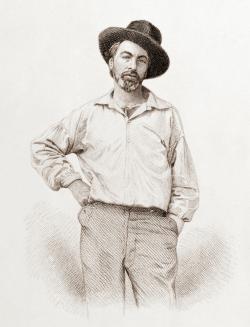
As I lay with my head in your lap camerado
As I lay with my head in your lap camerado,
The confession I made I resume, what I said to you and the open air I
resume,
I know I am restless and make others so,
I know my words are weapons full of danger, full of death,
For I confront peace, security, and all the settled laws, to unsettle
them,
I am more resolute because all have denied me than I could ever have
been had all accepted me,
I heed not and have never heeded either experience, cautions,
majorities, nor ridicule,
And the threat of what is call’d hell is little or nothing to me;
And the lure of what is call’d heaven is little or nothing to me;
Dear camerado! I confess I have urged you onward with me, and still
urge you, without the least idea what is our destination,
Or whether we shall be victorious, or utterly quell’d and defeated.
Walt Whitman
(1819 – 1892)
As I lay with my head in your lap camerado
From: Leaves of grass
• fleursdumal.nl magazine
More in: Archive W-X, Archive W-X, Whitman, Walt
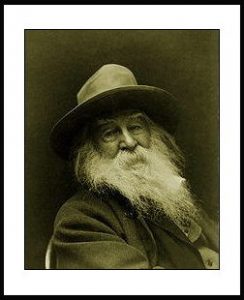
Walt Whitman
(1819 – 1892)
“So Long!”
1
To conclude–I announce what comes after me;
I announce mightier offspring, orators, days, and then depart,
I remember I said, before my leaves sprang at all,
I would raise my voice jocund and strong, with reference to consummations.
When America does what was promised,
When there are plentiful athletic bards, inland and sea-board,
When through these States walk a hundred millions of superb persons,
When the rest part away for superb persons, and contribute to them,
When breeds of the most perfect mothers denote America,
Then to me my due fruition.
I have pressed through in my own right,
I have offered my style to every one–I have journeyed with confident step.
While my pleasure is yet at the full, I whisper, ” So long!”
And take the young woman’s hand, and the young man’s hand for the last
time.
2
I announce natural persons to arise,
I announce justice triumphant,
I announce uncompromising liberty and equality,
I announce the justification of candour, and the justification of pride.
I announce that the identity of these States is a single identity only,
I announce the Union, out of all its struggles and wars, more and more
compact,
I announce splendours and majesties to make all the previous politics of
the earth insignificant.
I announce a man or woman coming–perhaps you are the one (“So long!”)
I announce the great individual, fluid as Nature, chaste, affectionate,
compassionate, fully armed.
I announce a life that shall be copious, vehement, spiritual, bold,
And I announce an old age that shall lightly and joyfully meet its
translation.
3
O thicker and faster! (“So long!”)
O crowding too close upon me;
I foresee too much–it means more than I thought,
It appears to me I am dying.
Hasten throat, and sound your last!
Salute me–salute the days once more. Peal the old cry once more.
Screaming electric, the atmosphere using,
At random glancing, each as I notice absorbing,
Swiftly on, but a little while alighting,
Curious enveloped messages delivering,
Sparkles hot, seed ethereal, down in the dirt dropping,
Myself unknowing, my commission obeying, to question it never daring,
To ages, and ages yet, the growth of the seed leaving,
To troops out of me rising–they the tasks I have set promulging,
To women certain whispers of myself bequeathing–their affection me more
clearly explaining,
To young men my problems offering–no dallier I–I the muscle of their
brains trying,
So I pass–a little time vocal, visible, contrary,
Afterward, a melodious echo, passionately bent for–death making me really
undying,–
The best of me then when no longer visible–for toward that I have been
incessantly preparing.
What is there more, that I lag and pause, and crouch extended with unshut
mouth?
Is there a single final farewell?
4
My songs cease–I abandon them,
From behind the screen where I hid, I advance personally, solely to you.
Camerado! This is no book;
Who touches this touches a man.
(Is it night? Are we here alone?)
It is I you hold, and who holds you,
I spring from the pages into your arms–decease calls me forth.
O how your fingers drowse me!
Your breath falls around me like dew–your pulse lulls the tympans of my
ears,
I feel immerged from head to foot,
Delicious–enough.
Enough, O deed impromptu and secret!
Enough, O gliding present! Enough, O summed-up past!
5
Dear friend, whoever you are, here, take this kiss,
I give it especially to you–Do not forget me,
I feel like one who has done his work–I progress on,–(long enough have I
dallied with Life,)
The unknown sphere, more real than I dreamed, more direct, awakening rays
about me–“So long!”
Remember my words–I love you–I depart from materials,
I am as one disembodied, triumphant, dead.
Walt Whitman poetry
fleursdumal.nl magazine
More in: Archive W-X, Whitman, Walt
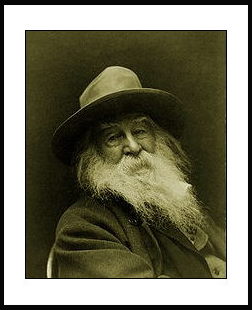
Walt Whitman
(1819 – 1892)
Poets to come!
1
Poets to come!
Not to-day is to justify me, and Democracy, and what we are for;
But you, a new brood, native, athletic, continental, greater than before
known,
You must justify me.
2
I but write one or two indicative words for the future,
I but advance a moment, only to wheel and hurry back in the darkness.
I am a man who, sauntering along, without fully stopping, turns a casual
look upon you, and then averts his face,
Leaving it to you to prove and define it,
Expecting the main things from you.
Walt Whitman poetry
fleursdumal.nl magazine
More in: Archive W-X, Whitman, Walt
Thank you for reading Fleurs du Mal - magazine for art & literature